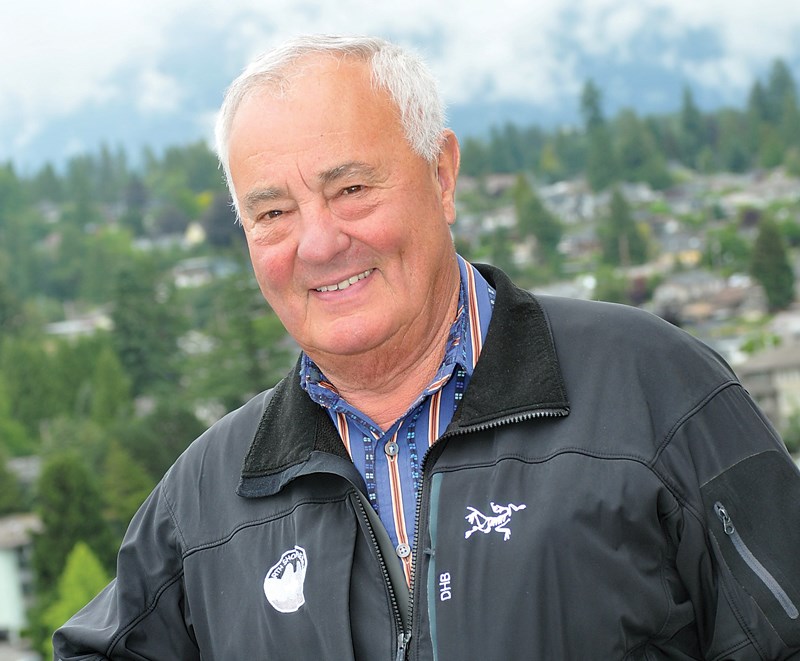They’d headed to Goat Mountain to save a life.
But as they marched through white backcountry in taxicab-yellow rain slickers – bone-tired and with one member battered and nearly burned – their own lives were in jeopardy.
“We almost died,” notes Dave Brewer.
It was 1965. North Shore Civil Defense was about to become North Shore Rescue, but it hadn’t earned that name yet.
Brewer and his brother Gerry had grown up in a Dempsey Road house their father built alongside the farms that stretched across Lynn Valley.
“Our backyard was Grouse Mountain,” Brewer recalls, speaking with a power and precision that belie his 79 years. “Being in the woods all the time was part of our growing up.”
In his 20s, Brewer opened the North Shore Shopper (which would eventually become this newspaper) and saw an ad recruiting young men to train in civil defense. He jumped at it.
The Cuban Missile Crisis was fresh in the memory and Nikita Khrushchev’s United Nations outburst had made his shoes the world’s most famous footwear.
In the interest of national security, Brewer and his cohorts were outfitted with Second World War-era helmets, leather gloves, a six-foot sash cord and coveralls (which he still trots out on occasion).
In November 1965, a hiker tumbled on Goat Mountain and the RCMP alerted the civil defenders.
Without any snowshoes, the crew quickly found themselves waist-deep in snow. Their discomfort was exacerbated by oilskin slickers that made you “sweat like a dog.”
After reaching the mountain the team did “one of the stupidest things we could ever do,” Brewer reflects.
They fashioned a harness for one of the volunteers, Ed Nicholson, and lowered him down the side of a cliff.
“As we’re pulling him back up, we’re dragging his face and the rest of his body against the rock face,” Brewer recollects. “Ed was trying to yell, telling us to stop.”
But it was windy and the only communications system they had was a radio “the size of a case of beer.”
They put their “almost hypothermic” teammate into a sleeping bag and plunked him down near the fire.
Flames leapt from the campfire to the sleeping bag before being extinguished.
“It was just a gong show,” Brewer says. “We thought that we could save this person.”
But it wasn’t over yet.
After a night teetering on brink of total physical exhaustion, the RCMP spotted the hiker.
It would now be a recovery, not a rescue.
The team worked their way to a ledge where a volunteer put the hiker in a body bag and lowered him.
The body bag was “vintage World War II” and one by one, the handles ripped.
The bag tumbled.
The team’s performance earned them what the late NSR leader Tim Jones would eventually turn into a tradition: the post-mission shred.
A coroner beseeched the men to pay more attention and ensure further trauma not be inflicted on a corpse.
His words stayed with them, according to Brewer.
“We were trained in civil defense, not in bush and mountain rescue,” he notes. “That is when we started to train ourselves.”
Brewer established new techniques, tried different methods and beseeched the province for help.
The Lynn Valley kid eventually took on a role as provincial search and rescue co-ordinator, which was somewhat less lucrative than he’d hoped.
With “sugar plums dancing in my head,” Brewer recalls asking about remuneration.
“‘Remuneration? It’s a volunteer position,’” he remembers being told.
Brewer took the job.
After all, he had ideas, and at a meeting that united volunteers from across B.C.’s Interior, he let them in on his vision of a “co-ordinated, integrated, layered, effective, efficient response.”
His speech prompted a four word, unprintable response, which summed up Brewer and his speech as: identical fecal matter, dissimilar body part.
Apparently, Brewer’s speech was achingly familiar to rescue teams who were used to squeezing each dime till the sailboat capsized.
But Brewer meant what he said. And over half a century he did all he could to support search and rescue teams.
“It became a passion and some people said it was almost an obsession,” he says, thanking his wife Beverley for allowing him to do the work he loved.
He participated in more than 600 rescues and fought to make sure crews learned something from every call.
Asked about getting the Sovereigns Medal for Volunteers at a recent ceremony, Brewer turns humble.
“Well, it only happens once in your life, I think. It’s one hell of a feeling.”
Also receiving awards at the Dec. 8 ceremony were West Vancouver’s Michael Devine, who earned the medal of bravery for helping to rescue five passengers from a burning vehicle near Whistler, four of whom survived.
Don Krogseth, also from West Vancouver, was honoured for his work in getting a seven-kilometre stretch along the Englishman River designated a conservation area.



